#Local Keywords Optimization
Explore tagged Tumblr posts
Link

#Local Keywords Optimization#SEO Agency New York#White Label SEO Agency#SEO reseller services New York#search engine rankings
0 notes
Text
How Local SEO Increases Profits: A Comprehensive Guide with Facts and Figures
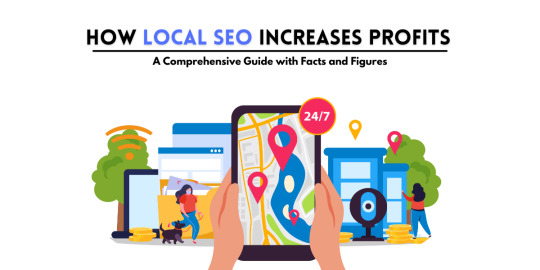
In today's digital landscape, businesses must leverage every tool available to stay competitive. Local SEO (Search Engine Optimization) is one of the most effective strategies for attracting customers in your geographic area. This comprehensive guide will explore how Local SEO can significantly enhance your profits, backed by facts and figures, and provide actionable tips to boost your local search presence.
What is Local SEO?
Local SEO focuses on optimizing a business's online presence to attract customers from specific localities. This includes appearing in local search results, Google Maps, and the coveted Google Local Pack.
Why is Local SEO Important?
Increased Visibility
Fact: 46% of all Google searches seek local information.
Figure: Businesses that optimize for local SEO can see a 14% increase in web traffic.
Higher Conversion Rates
Fact: 78% of mobile local searches result in an offline purchase.
Figure: Local searches contribute to 28% of all purchases.
Cost-Effective Marketing
Local SEO targets users actively seeking your services, leading to a lower cost per acquisition.
Key Components of Local SEO
1. Google My Business (GMB) Optimization
Claim and Verify Your Listing: Ensure that your GMB profile is active and verified.
Consistent Information: Keep your business name, address, and phone number (NAP) accurate across all platforms.
Engagement: Update your GMB listing with posts, photos, and promotions to engage customers.
2. Local Keywords
Keyword Research: Identify local search terms relevant to your business.
Implementation: Use these keywords in your website content, meta tags, and GMB listing.
3. On-Page SEO
Title Tags and Meta Descriptions: Optimize these elements with local keywords.
Schema Markup: Use schema to help search engines understand your business details.
4. Customer Reviews
Encouragement: Prompt satisfied customers to leave reviews on your GMB and other review platforms.
Response Strategy: Engage with all reviews—both positive and negative—to demonstrate that you value customer feedback.
5. Local Backlinks
Relationship Building: Network with local businesses and influencers to earn backlinks.
Community Engagement: Participate in local events or sponsorships to increase exposure and credibility.
Tips and Tricks to Boost Local SEO
Leverage Social Media: Share local content, promotions, and events to drive traffic and engagement.
Optimize for Mobile: Ensure your website is mobile-friendly, as a significant portion of local searches occurs on mobile devices.
Create Location-Specific Content: Develop blogs, guides, or resources that cater to local interests and events.
Use Local Citations: List your business in local directories like Yelp and Yellow Pages with consistent NAP information.
Monitor Analytics: Use Google Analytics and Google Search Console to track performance and refine your strategy.
Facts and Figures Supporting Local SEO Success
Search Engine Behavior: 88% of consumers who conduct a local search visit a related business within a day.
Consumer Trust: 92% of consumers trust online reviews as much as personal recommendations.
Mobile Searches: 76% of people who search for something nearby visit a business within a day.
Conclusion
Investing in Local SEO is essential for businesses looking to enhance their visibility and increase profits. By optimizing your online presence, focusing on local keywords, managing customer reviews, and building local backlinks, you can develop a strong local marketing strategy that drives business growth.
#Local SEO#Search Engine Optimization#Local search marketing#Google My Business#Local visibility#Local keywords#Local citations
1 note
·
View note
Text
Local SEO Strategy For Flooring Contractors | Mdjahidhasan It’s no longer a secret that Local SEO is one of the best marketing strategies that help to gain visibility in local searches, improve organic traffic
#localseo#seo#seostrategy#local seo strategy#seo services#search engine optimization#keywords#off page seo
6 notes
·
View notes
Text
What is SEO ................?
Hi Guys! I am Masiur Rahman before you. I am professional Digital Marketer and SEO Expert. I will manage any kind of social media ( Facebook, Twitter, Instagram, Tumblr, Linkedin, Reddit, Pinterest etc. ). I will create Twitter & Facebook Ads Campaign & Boosting. Also I will do SEO ( Search Engine Optimization ). like: On-page SEO, Of-page SEO, Technical SEO, Keyword Research, Competitor Analysis, Google Search Console, Google Analytics.
#seo tools#social marketing#seo expert#smm services#social media marketing#keyword research#online marketing#seo optimization#backlinks#emailmarketing#youtube marketing#seo marketing#seo#seo services#seo agency#local seo#google ads#google search console#google search results#google search api#search engine#marketing#copywriting#networking
3 notes
·
View notes
Text
I will do monthly SEO services with manual do follow backlinks for google top ranking

If you are looking to Boost your website's Google top Rankings with a White Hat manual Backlinks monthly SEO Service then you are at the right gig. Quality do-follow backlinks or link building are especially valuable for ranking in SE0.
I will provide you monthly SE0 services with organic do-follow backlinks for Google to rank your website. This manual backlink service will help your website achieve google's top ranking for a long time.
What Will You Get from My Monthly SEO Services?
Over time, better rankings
100% White Hat dofollow backlinks foll0wing Google Webmaster Guidelines
High-authority manual backlinks that are a mix of nof0llow and dof0llow
high-quality Link building from respectable domain authority sites
Benefits of my monthly SEO services:
developed Website Growth & Value
developed (DA, PA, DR, UR, and AR)
developed organic keyword rankings
developed relevant organic traffic
#local seo#off page seo#seo expert#seo services#link building#search engine optimisation services#googleranking#off page optimization#website seo#keyword research
15 notes
·
View notes
Text
E-commerce SEO Strategies Unveiled: Boosting Sales and Visibility
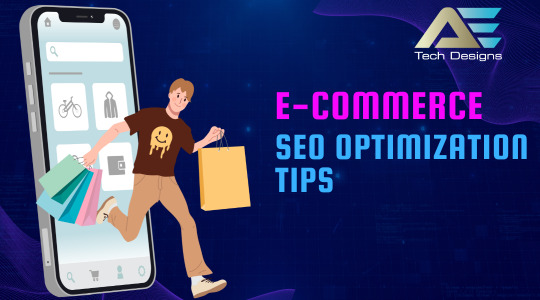
In the ever-evolving landscape of e-commerce, staying ahead of the competition requires not only a compelling product but also a well-optimized online presence. In this comprehensive guide, we will delve into the world of E-commerce SEO optimization. No buzzwords, just actionable insights to enhance your online store's visibility and boost sales. Let's get started
Understanding the Basics
To lay a solid foundation, let's start with the basics. E-commerce SEO optimization involves a series of on-page and off-page strategies aimed at improving your website's ranking on search engine results pages (SERPs). This optimization is pivotal for attracting high-quality organic traffic, increasing sales, and staying competitive in the digital marketplace.
Keyword Research
The cornerstone of any successful SEO campaign is thorough keyword research. Begin by compiling a list of relevant keywords that reflect your products, services, and industry. In addition to your primary keywords, consider long-tail keywords, as they often have less competition and can yield highly targeted traffic. For instance, if you're a digital marketing agency in Seattle, keywords like "digital marketing services in Seattle" and "Seattle SEO company" are goldmines.
On-Page Optimization
High-Quality Content: Your website's content should not only be unique but also provide value to your audience. Craft product descriptions, blog posts, and landing pages that resonate with your target audience. Incorporate the primary and long-tail keywords naturally within the content while maintaining readability and a professional writing style.
Page Titles and Meta Descriptions: Ensure that each page has a unique and descriptive title tag and meta description. These elements should include relevant keywords and provide a concise summary of the page's content. This encourages users to click through to your website from the search results.
Header Tags: Use header tags (H1, H2, H3, etc.) to structure your content. This not only improves readability but also helps search engines understand the hierarchy of information on your pages.
User Experience (UX) Matters
Google values user experience, so make sure your website is user-friendly. Optimize for mobile devices, improve page load times, and ensure intuitive navigation. A seamless UX not only pleases visitors but also satisfies search engine algorithms.
Backlink Building
Off-page SEO is as crucial as on-page optimization. Seek high-quality backlinks from reputable websites in your industry. Guest posting, influencer collaborations, and participating in industry forums can all help in this regard.
Monitoring and Analytics
Track your SEO efforts using tools like Google Analytics and Google Search Console. Regularly review your website's performance, make necessary adjustments, and stay updated on SEO trends and algorithm changes.
Conclusion:
In the ever-competitive world of e-commerce, mastering SEO optimization is your key to success. By adhering to these strategies and tips, you can enhance your website's visibility, drive organic traffic, and ultimately boost your sales. If you're seeking expert assistance, consider partnering with AE Tech Design Agency, your trusted SEO company in Seattle. Contact us today to explore how our digital marketing services can elevate your online presence and drive meaningful results.
Remember, the world of SEO is constantly evolving, so staying informed and adapting your strategies accordingly is essential for long-term success.
#E-commerce SEO#SEO Optimization#E-commerce Strategies#SEO Tips#Organic Traffic#Search Engine Rankings#Keyword Research#On-Page SEO#Off-Page SEO#User Experience (UX)#Backlink Building#Local SEO#Google Analytics#Digital Marketing#SEO Trends#SEO Algorithm#Online Visibility#Website Performance#SEO Company#Seattle Digital Marketing
5 notes
·
View notes
Text

Why Isn’t My Business Appearing in Google Search Results? For local businesses, Google Search and Maps are the most important aspects of search engines that show results among competitors. Creating Google My Business is a must to show your business or products to customers and visitors to gain traffic and leads.
#SEO services#SEO outsourcing#Google My Business#Link Building Company#SEO company#White label SEO Company#Local SEO#Keyword research#SEO consulting#Website optimization#SEO strategies for business#Google algorithm
0 notes
Text
How to Test Global Content Localization with Proxies IPs
Today, localizing website content for global markets is no longer just about simple translation; it also means Rotating digital content to fit local languages by conforming it to cultural norms and linguistic styles, as well as to each region's unique search patterns. Localization helps improve user experience and search engine optimization (SEO) results. Proxies IP allows you to Web Testing your website for worldwide access, get better response latency, and make sure it renders correctly everywhere so that even your local searches can benefit from global rankings.
In this article, I will look at how Proxies can help with content localization testing from both a technical and business perspective, as well as practical applications used by multinational companies.
1. Why is content localization so important?

(1) Enhanced user experience
A truly localized website provides a tailored content experience for users in your target market. This includes everything from language and images to localized product information, payment methods and logistics policies. For example, users in the US will be used to the US dollar, while those in the UK will expect to see the pound sign. For users, familiar content makes them feel like the site was designed specifically for them, which greatly increases user satisfaction and conversion rates.
(2) Improve SEO Ranking

(3) Achieving market share growth
Effective content localization not only attracts more local users but also leads to higher conversion rates. If you go for localization for different markets in different countries or regions, it will not only increase customer trust, but also better promote promotions and ultimately increase sales and market share.
2. The role of Proxies in content localization testing
Proxies IP can help simulate users from different countries and regions to visit your website, as an important technical tool that can help organizations to Web Testing their websites and applications in different countries from multiple dimensions to ensure the consistency of content, functionality and user experience. Here are the core roles of Proxies IP in content localization testing:
(1) Simulate the search experience of global users
With Proxies IPs, you can simulate users in different countries and regions around the world and see how keywords perform in those markets. Different geographic locations may result in different search results and keyword rankings. For example, a keyword that ranks #1 in the US may not rank in France. Proxies IP can help you identify these differences and adjust your SEO strategy.
(2) Checking the accuracy of localized content presentation
One of the core aspects of Content Localization Testing is to ensure that the Web displays the correct content based on the user's region. This includes not only language conversion, but also localized advertisements, promotions, currency symbols, logistical information, and more. Proxies IP can simulate users in the target region to ensure that all localized elements are displayed accurately.
(3) Detecting page loading performance in different regions
Differences in network infrastructure in different regions can lead to significant variations in page loading speed and performance. With Proxies IP, you can simulate Porfiles in different countries, test page loading speed and response time, and optimize page performance through data analysis to ensure consistent global user experience.
3. Step-by-step guide to content localization testing via Proxies IPs
To help you conduct content localization testing effectively, here are the exact steps to follow:
(1) Choosing the right Proxies IP service
Before conducting a global localization test, you should first choose a Proxies IP service with wide coverage and stable performance. Proxies are divided into two types: Residential Proxies and Data Center Proxies: Residential IP: from a real home network with higher anonymity and real user simulation effects, especially suitable for e-commerce platforms, social media or operations that require high anonymity. Data Center IP: Relatively inexpensive and suitable for large-scale content crawling and testing, but sometimes blocked by certain platforms and not suitable for highly sensitive testing scenarios.
So when using SEO Proxies, it's best to use a Residential Proxies , which is perfect for observing the data situation in different countries and regions.
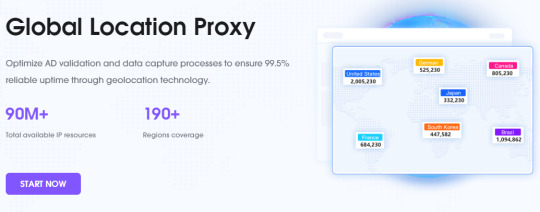
Click here to sign up for free Proxies IP!
(2) Conduct keyword ranking tests
Use Proxies IPs to simulate users from different countries visiting Google or other local search engines.
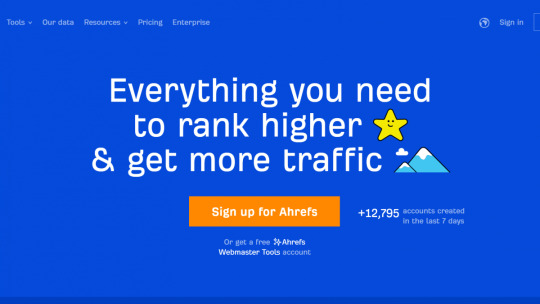
(3) Verification of the accuracy of localized content
Use Proxies IPs to access your website and simulate the user experience in the target country.
Check that the website displays the correct language, currency, date format, and localized content as expected.
Verify that the site offers localized promotions and ads in different countries. For example, European users see different ads than American users.
(4) Testing global page load speed
Page loading speed not only affects user experience, but also directly affects SEO ranking. With Proxies IP, you can Web Testing the loading speed of your website in different regions of the world, find out the slow loading regions and optimize them.

4. How to optimize global SEO strategies based on data
Once you've completed the Proxies IP test and verified the accuracy of the localized content, you can adjust your global SEO strategy based on this data. Here are a few key steps on how to optimize your SEO based on the test results:
(1) Keyword optimization
After acquiring keyword rankings across the region through Proxies IP, analyze which keywords are not achieving the expected results in the poorly performing regions. Adjust the density and layout of keywords according to the search habits and needs of different markets. For example, certain terms may be searched more frequently in a certain country but not attractive for traffic in other regions.
(2) Content adjustment
Adjust content strategy for different regions based on Proxies IP test results. Ensure that the content is not only compliant with linguistic standards, but also with cultural habits. For example, visual elements, promotional phrases and user interaction design should match the aesthetics and expectations of local users.
(3) Page speed optimization
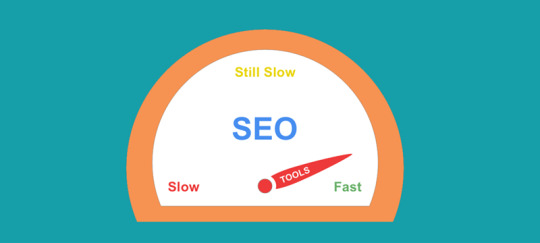
(4) Combined use of multiple analytical tools
In addition to Proxies IP, you can also combine SEO tools such as Google Analytics, Google Search Console, etc. to deeply analyze user behavior, traffic sources and keyword performance in different markets around the world. Through the combination of multi-dimensional data, you can get a more in-depth optimization plan.
Conclusion Localizing content for testing is not only an important step in ensuring a good user experience, but it's also key to improving SEO performance.
With Proxies IPs, you can simulate user access from different national devices and regions, ensuring that content, ads, promotions, and page load speeds are delivered globally.
Proxies provide a convenient and efficient solution for global content testing, whether it's testing keyword performance or ensuring the accuracy of localized content for your global SEO strategy.
0 notes
Text
Improve Online Presence in the USA with E-commerce SEO Services
Having a strong online presence is essential for success in the contemporary digital environment. For e-commerce businesses, effective SEO strategies can make a significant difference in attracting and retaining customers. This article explores the importance of ecommerce SEO services USA and how they can elevate your online store's visibility.
Understanding E-commerce SEO
Online shopping Optimizing your online store for search engines like Google is known as search engine optimization, or SEO. This process includes keyword research, on-page SEO, and link building. The goal is to drive organic traffic to your site, leading to higher conversions and sales.
Why SEO Matters for E-commerce
The e-commerce market is competitive. It's critical to stand out in the millions of businesses competing for customers' attention. Effective ecommerce seo services usa can help you:
Increase Visibility: Higher search rankings mean more visibility for your brand. The more people see your store, the greater the chance of sales.
Build Credibility: Consumers trust search engines. Having the top spot in search results indicates authority and dependability.
Enhance User Experience: Good SEO practices improve website usability, making it easier for customers to navigate your site and find what they need.
Key Components of E-commerce SEO Services in the USA
Keyword Research Identifying the right keywords is the cornerstone of any SEO strategy. Tools like Google Keyword Planner can help you find terms potential customers are searching for. Integrating these keywords into your product descriptions, titles, and meta tags is vital.
On-Page Optimization This involves optimizing individual pages to rank higher. This includes improving title tags, headers, and image alt texts. Each product page should be unique, providing detailed information and engaging content.
Content Creation Quality content is crucial for engaging visitors. Consider starting a blog where you discuss your products. In addition to improving SEO, this establishes you as a professional in your field.
Share tips, guides, and product reviews to attract more visitors.
Technical SEO A well-structured website is essential. Make sure your website loads quickly, is mobile-friendly, and utilizes HTTPS for security. These factors significantly influence your rankings.
Link Building Building backlinks from reputable sites enhances your domain authority. Engage in collaborations, guest posting, and partnerships to increase the number of high-quality backlinks pointing to your website.
Local SEO for E-commerce
If your e-commerce business also has a physical presence, local SEO is vital. This involves optimizing your online presence for local searches. Use Google My Business to enhance your visibility in local searches. Encourage customers to leave reviews, as they can improve your local ranking.

Tracking and Analytics
Measuring your SEO efforts is critical. Use tools like Google Analytics to track visitor behavior, conversion rates, and the effectiveness of your keywords. With this knowledge at your disposal, you can continue to hone your approach. Investing in ecommerce seo services usa is a game-changer for online businesses. It not only enhances visibility but also improves user experience and builds credibility. As competition grows, leveraging these SEO strategies can help your e-commerce store thrive. Whether you are a small business or an established brand, a strong SEO foundation is key to achieving long-term success. Embrace these techniques, and watch your online sales soar!
#eCommerce SEO services USA#eCommerce search engine optimization#SEO for online stores#eCommerce SEO expert#Shopify SEO services#WooCommerce SEO optimization#eCommerce keyword research#product page SEO#local SEO for eCommerce#SEO strategies for eCommerce#eCommerce website optimization#SEO audit for eCommerce sites#eCommerce link building services#mobile SEO for online stores#eCommerce conversion optimization
0 notes
Text
#local seo#off page seo#seo expert#fiverr#fiverr gig#off page optimization#seo agency#seo services#keyword research#marketing
2 notes
·
View notes
Text
Effective Strategies for Local SEO
As a small business owner in Australia, you know how important it is to draw in local customers. With 46% of all Google searches looking for nearby info, local SEO is key to staying ahead and beating your rivals1. To boost your online visibility and get more people walking through your door, you need to master local SEO strategies. This guide will show you why local search engine optimization…
#Business Listings#Geo-targeted SEO#Google My Business#Local Backlinking#Local Keywords#Local search optimization#Local SEO strategies#Local SEO Tactics#Location-Based SEO
0 notes
Text
International SEO: Optimizing for Global Audiences

In today’s interconnected world, businesses can no longer rely solely on local markets for growth. The internet has opened up the possibility of reaching global audiences, but for that to happen successfully, businesses need to implement a solid International SEO strategy. This guide will provide insights on how to optimize your website for different countries and languages, ensuring that your content ranks well across various global search engines and connects with audiences in different regions.
What is International SEO?
International SEO involves optimizing a website to ensure that search engines can easily identify which countries and languages it is targeting. It is an extension of traditional SEO that goes beyond improving rankings in one country or language, focusing instead on tailoring content, keywords, and technical aspects to meet the unique needs of users from various global markets.
Why is International SEO Important?
Expanding Global Reach: International SEO allows you to target users across different countries, widening your audience base and attracting potential customers worldwide.
Improving User Experience: Offering localized content in users' native languages enhances their experience, making it easier for them to find the information they seek.
Higher Conversions: When users find content tailored to their language and region, they are more likely to engage with your website, leading to improved conversion rates.
Staying Competitive: International SEO gives you an edge over competitors who haven’t optimized their websites for a global audience, allowing you to tap into underserved markets.
Key Components of International SEO
To optimize your website for global audiences, focus on the following key components:
1. Identifying Target Markets
The first step in international SEO is to identify which countries and regions you want to target. Research market demand for your products or services in these areas and understand local search behavior. This analysis will help you determine where to allocate your resources and how to craft your content for specific audiences.
2. Choosing the Right Website Structure
There are three common ways to structure your website for international SEO:
Country Code Top-Level Domains (ccTLDs): These are domain extensions specific to a country, such as .uk for the United Kingdom or .de for Germany. They clearly signal to search engines and users that your site is targeting a particular region.
Subdomains: You can create subdomains for different countries or languages under the same main domain (e.g., uk.example.com for the UK). This method is easier to manage than multiple ccTLDs.
Subdirectories: This method uses subfolders under the main domain to target different regions (e.g., example.com/uk/). It’s often the easiest and most cost-effective solution for businesses managing multiple country-specific versions of their site.
Each structure has its advantages, but the decision should be based on your specific goals, the level of localization needed, and your available resources.
3. Implementing Hreflang Tags
Hreflang tags are crucial for telling search engines which language and region-specific content to display to users. This ensures that people from different countries are directed to the correct version of your website. These tags are essential for websites with multiple language or country versions, as they prevent content duplication issues and help improve SEO rankings for localized content.
4. Localized Keyword Research
Just as keyword strategies differ between industries, they also vary by country and language. Simply translating keywords from one language to another may not capture the search intent of users in another region. Therefore, conducting localized keyword research is essential.
Consider the following when performing keyword research for different regions:
The local language, slang, and phrases used by target audiences
Differences in search behavior across countries
Tools like Google Keyword Planner, Ahrefs, or SEMrush to analyze search volumes in different regions
By understanding the local context, you can better target your content and improve your visibility in each market.
5. Content Localization
Translation alone is not enough when targeting international audiences. Localization means adapting your content to suit cultural and regional preferences, ensuring it resonates with local users. This includes:
Adapting written content to local customs, expressions, and tone
Modifying images, videos, and other multimedia content to align with local aesthetics
Adjusting currencies, date formats, and units of measurement
Creating region-specific promotions, offers, and calls-to-action
Localized content demonstrates that your business values its international customers, fostering trust and brand loyalty.
6. Technical Optimization for Global Audiences
Technical SEO plays a significant role in improving site performance for international users. Ensure that your website is optimized for speed and mobile responsiveness, regardless of the region. Some key technical considerations for international SEO include:
Geotargeting: Use tools like Google Search Console to indicate the target country for each version of your website.
Fast Load Times: Consider hosting your site on local servers for better speed and performance in specific regions.
Mobile Optimization: Given the global rise in mobile internet usage, ensure that your website is fully optimized for mobile devices in every market.
7. Building Local Backlinks
Building a strong backlink profile is vital for boosting your SEO rankings, and it’s no different for international SEO. To improve your site’s domain authority in specific regions, focus on acquiring backlinks from local websites, blogs, and influencers. Partnerships with reputable local organizations or guest posting on region-specific websites can help you build valuable local links that improve your visibility in new markets.
8. Monitoring International SEO Performance
Once your international SEO efforts are in place, regularly monitor their performance. Use tools like Google Analytics and Google Search Console to track:
Organic traffic by region
Keyword rankings in different markets
User behavior and engagement by country
Conversion rates and bounce rates across regions
Analyzing these metrics will help you understand which markets are performing well and where adjustments are needed.
Challenges in International SEO
Language Barriers: Adapting content for different languages is a challenge, particularly when dealing with regions that have diverse dialects or cultural nuances.
Technical Complexity: Structuring your website and correctly implementing hreflang tags can be a technical challenge, requiring meticulous planning.
Content Duplication: Without proper implementation, you risk search engines indexing duplicate content, which can hurt your rankings.
Resource Management: Maintaining multiple versions of your website for different regions requires considerable resources, from content creators to SEO specialists.
Conclusion
International SEO is a powerful tool for businesses looking to expand their digital footprint globally. By optimizing your website for different languages and regions, you can reach new customers, improve user experiences, and ultimately drive growth in markets beyond your home country.
Start by identifying your target markets, structuring your website for international SEO, conducting localized keyword research, and ensuring content is culturally relevant. With the right strategy in place, your business can achieve sustainable, global growth.
#International SEO#Global SEO#Localization#Keyword Research#Multilingual SEO#Website Optimization#Global Marketing#Search Engine Optimization
1 note
·
View note
Text
How AI is Revolutionizing Voice Search Technology
The Hidden Link Between AI Voice Search and SEO: What You Need to Know AI-powered voice search is revolutionizing how users interact with technology, turning searches into seamless, conversational experiences.
Voice search is transforming how we interact with technology, turning searches into effortless conversations. No more typing—just speak to your device, and AI does the rest. In this blog, we’ll explore the evolution of voice search. We’ll discuss how AI powers it and why businesses must adapt to stay competitive. The Evolution of AI Voice Search Technology AI voice search technology has come a…
#AI and data analysis#AI ethical concerns#AI in everyday life#AI limitations#AI natural language processing#AI voice search#autonomous AI systems#best tips for AI voice search SEO#conversational queries#creative AI applications#future of AI#how AI revolutionizes voice search#how businesses can adapt to AI-driven voice search#how does voice search work with AI#how to optimize for voice search with AI#I in local business voice search#keyword research#local SEO for voice search#machine learning in voice search#NLP in voice search#voice search optimization#voice search optimization for businesses#voice search SEO#what AI can do
0 notes
Text
#Creating Google My Business#SEO services#SEO Services Kelowna#SEO outsourcing#Google My Business#Link Building Company#SEO company#White label SEO Company#Local SEO#Keyword research#SEO consulting#Website optimization#SEO strategies for business
0 notes
Text

Everything You Need to Know About Local SEO For Businesses
These days brick and mortar businesses cannot be run without local SEO. People are actively searching with “nearby business” and “near me business” to find a particular product or service. Read more- https://www.goalmaximize.com/blog/localseo/everything-you-need-to-know-about-local-seo-for-businesses/
#b2b seo strategy#Local SEO agency services#Local SEO optimization#Local SEO for businesses#local SEO services#Effective keyword research
0 notes
Text
Ecommerce SEO Tips | Liveblack
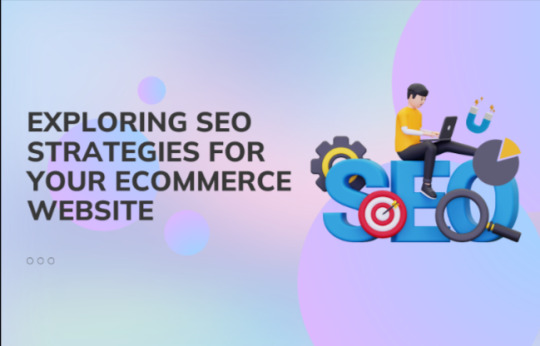
With search engine optimization, explore how you can improve your ecommerce website performance. SEO strategies for ecommerce websites will help you drive traffic and increase sales. As we all know, ecommerce is a growing industry, and a lot of competition is out there. So, it is important to apply potent SEO strategies for better and expected results.
When you are looking to improve your ecommerce website, these SEO Tips for Ecommerce Websites will help you rank your website higher in search engines.
Keyword research in SEO -
Keyword research is an important part of SEO optimization for websites. You should be aware of the right keywords that your target audience uses to search. Different keyword planner tools will help you find relevant keywords for your ecommerce website. Once you’ve got to know the keywords used by your audience, you’ll have to update your website content accordingly.
In addition, long-tail keywords are the real deal. Long tail keywords can help you attract more traffic, and increase conversion rates, and all of these promote higher search engine ranking. Analyze which long-tail keywords people use to find their requirements, this way you can better understand their interests and craft your content marketing strategy accordingly.
Use keyword research tools to get the right keywords, gain insights into what your audience is searching for, and write content by that.
Link Building -
One thing ecommerce website owners have to remember is that ecommerce SEO is crucial for the success of your online store. Link building for SEO is an important aspect of improving your online business. Link building is all about obtaining backlinks from other websites to yours. Focus on getting high-quality backlinks from authenticated websites. High-quality content on your website will prepare other websites to link to your content or set them up for a link exchange program.
With the help of link building, search engines will find you authoritative and help you earn high rankings. It’s a potential way to develop long-term relationships with key influencers to make your online business more reliable.
Have a user-friendly website -
Designing a beautiful website is not enough, it’s crucial to be attentive to designing a good user experience. Having a well-designed website has benefits. Ensure people can have a good experience while visiting your website without the interference of unnecessary things. Have a clear user’s view that people can effortlessly navigate your website.
Give people a reason to visit your website easily and quickly, engage them with your products and services, and content. An appealing site and enhanced UX can offer your visitors a great experience and get higher search engine rankings.
Optimizing URL structure through SEO makes search results more substantial.
Improve website content -
Content is the king and engaging content plays an important role in ecommerce strategy. What does high-quality content bring to your business, let’s check out.
Builds trust among your audience
Increase traffic and conversions
Improve SEO rankings
Increase your store visibility
There are many types of content you can have on your website such as articles, blogs, updates on new product launches, photos, videos, Q&A, etc.
Observe your audience’s behavior and know them better as this analysis helps you create content that takes care of their requirements. Through this way, you can suggest a product, service, or solution that satisfies your audience.
Get to know what type of content your audience likes the most. Craft your content according to your audience’s taste and maintain a content calendar to publish time-to-time content so that it will be updated regularly.
On-page optimization -
This will include optimizing website content and its structure. Product description optimization is a process of making descriptions more engaging by providing necessary information. This will also impact search engine rankings. Optimize titles, descriptions, headings, images, etc. because a well-structured website keeps you ahead of competitors.
Make sure your ecommerce website has a clear sequence and interlinked pages so users can navigate easily.
Optimize site for mobile screens as people nowadays are more inclined to mobile phones to buy or search for what they want.
There are search engine optimization tools that will help you in improving your rankings in search engine result pages. Increased visibility and brand awareness lead to more sales.
Content marketing strategy -
One of the great ways to help your ecommerce business improve is to use content marketing. Drive traffic to your website through a content marketing strategy by crafting infographics, blogs, and creative social media posts.
Prepare high-quality and relevant content to engage your audience in every way possible. Also, don’t forget to add the right keywords and meta tags so that your content reaches an audience. Because SEO optimization in content can increase visibility.
You can also promote your content through internal linking as well as reach out to other websites for guest posting.
When you are looking forward to getting website rankings without spending a single penny, organic search engine optimization can help you in a way. This is a marketing strategy that is planned to improve rankings through unpaid search results.
Organic SEO is a free way to enhance conversion rate and organic traffic. With every update that comes in Google, users can get benefits from it. Google Search Generative Experience(SGE) is one of the most advantageous updates users can ask for. This is an AI feature where a search engine will provide users with relevant information. SGE uses AI technology to provide answers to any complex query.
Merchant Center is a free tool for your ecommerce business that lets you manage product information. This tool can benefit you in ways -
Online listing of Google’s products
Get personalized reports
Brand recognition
Increase sales
Convert leads into customers
Optimize product feed
If you are thinking of improving your online presence, local SEO can help which leads to increased traffic, brand recognition, and visibility. When people or your loyal customers nearby will find your business, they choose you. This strategy also aids you in converting leads into customers in specific geographical areas.
Google’s ecommerce website review also builds trust amongst people for your ecommerce website. In short, there are ways you can create a trustworthy and the most advanced ecommerce website for your business. Ecommerce isn’t a business with a physical presence so customers can buy anything at any time.
We at Liveblack have a team of expert and experienced developers who have skill sets to develop websites in HTML5, WordPress, Shopify, Wix, PHP core, PHP Laravel, Bootstrap, etc. Tell us your requirements, and we’ve got you covered.
#search engine optimization#SEO strategies for ecommerce websites#SEO tips for ecommerce websites#SEO optimization for website#Link building for SEO#search engine rankings#ecommerce strategy#On-page optimization#Product description optimization#search engine optimization tools#Content marketing strategy#organic search engine optimization#Google Search Generative Experience#SEO optimization#Merchant Center#local SEO#Google's ecommerce website review#Keyword research in SEO#SEO for Ecommerce#Ecommerce SEO Tips#Ecommerce SEO Tool
1 note
·
View note